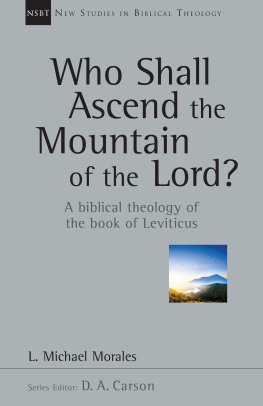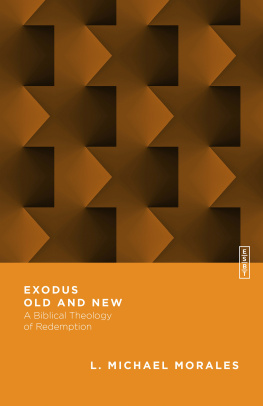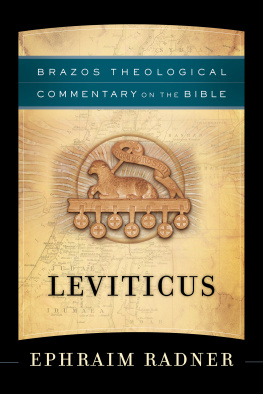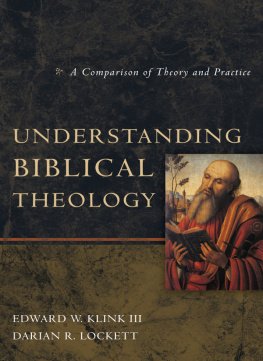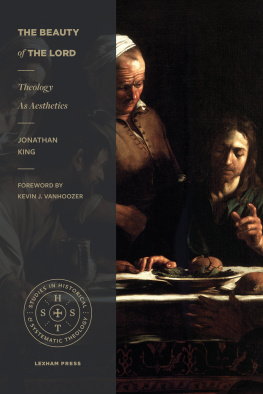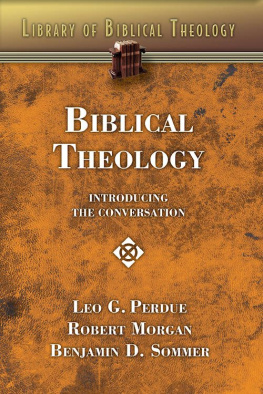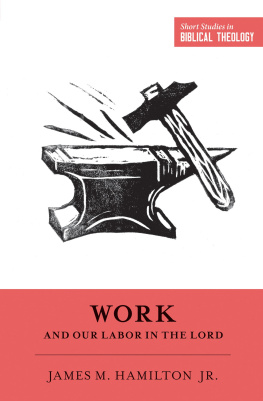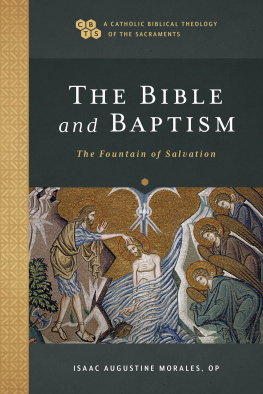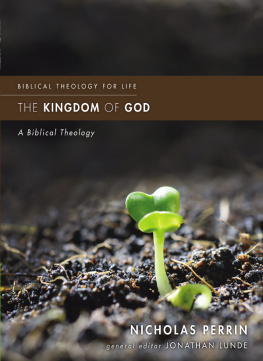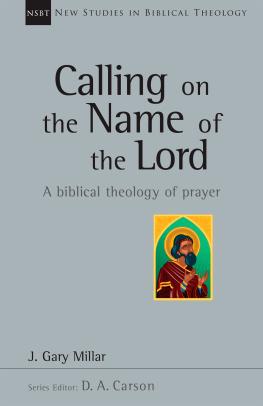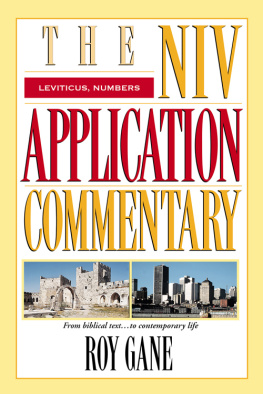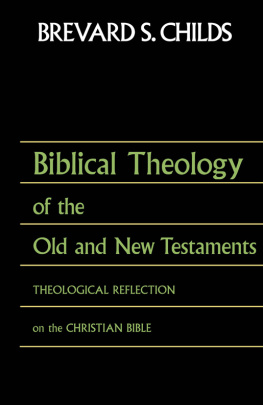NEW STUDIES IN BIBLICAL THEOLOGY 37
Who shall ascend the
mountain of the Lord?
NEW STUDIES IN BIBLICAL THEOLOGY 37
Series editor: D. A. Carson
Who shall ascend the
mountain of the Lord?
A BIBLICAL THEOLOGY OF
THE BOOK OF LEVITICUS
L. Michael Morales
INTERVARSITY PRESS
DOWNERS GROVE, ILLINOIS 60515
InterVarsity Press, USA
P.O. Box 1400
Downers Grove, IL 60515-1426, USA
ivpress.com
L. Michael Morales 2015
L. Michael Morales has asserted his right under the Copyright, Designs and Patents Act, 1988, to be identified as Author of this work.
All rights reserved. No part of this book may be reproduced in any form without written permission from InterVarsity Press.
InterVarsity Press, USA, is the book-publishing division of InterVarsity Christian Fellowship/ USA and a member movement of the International Fellowship of Evangelical Students. Website: intervarsity.org.
Unless otherwise indicated, all Scripture quotations are the authors own translation.
First published 2015
ISBN 978-0-8308-9986-9 (digital)
ISBN 978-0-8308-2638-4 (print)
Library of Congress Cataloging-in-Publication Data
Names: Morales, L. Michael.
Title: Who shall ascend the mountain of the Lord? : a biblical theology of
the Book of Leviticus / L. Michael Morales.
Description: [Nottingham, England] : Apollos ; Downers Grove, Illinois :
InterVarsity Press, 2015. | Series: New studies in biblical theology ; 37
| Includes bibliographical references and index. | Description based on
print version record and CIP data provided by publisher; resource not
viewed.
Identifiers: LCCN 2015037779 (print) | LCCN 2015038360 (ebook) | ISBN
9780830899869 (eBook) | ISBN 9780830826384 (pbk. : alk. paper)
Subjects: LCSH: Bible. Leviticus--Criticism, interpretation, etc.
Classification: LCC BS1255.52 (print) | LCC BS1255.52 .M67 2015 (ebook) | DDC
222/.1306--dc23
LC record available at http://lccn.loc.gov/2015038360
This digital document has been produced by Nord Compo.
Series preface
New Studies in Biblical Theology is a series of monographs that address key issues in the discipline of biblical theology. Contributions to the series focus on one or more of three areas: (1) the nature and status of biblical theology, including its relations with other disciplines (e.g. historical theology, exegesis, systematic theology, historical criticism, narrative theology); (2) the articulation and exposition of the structure of thought of a particular biblical writer or corpus; and (3) the delineation of a biblical theme across all or part of the biblical corpora.
Above all, these monographs are creative attempts to help thinking Christians understand their Bibles better. The series aims simultaneously to instruct and to edify, to interact with the current literature and to point the way ahead. In Gods universe, mind and heart should not be divorced: in this series we will try not to separate what God has joined together. While the notes interact with the best of scholarly literature, the text is uncluttered with untransliterated Greek and Hebrew, and tries to avoid too much technical jargon. The volumes are written within the framework of confessional evangelicalism, but there is always an attempt at thoughtful engagement with the sweep of the relevant literature.
Hebrews 7:1128 reminds us that the priestly system of the old covenant is so important that should a change take place in the priesthood, there must be a change in the entire law-covenant structure. That strongly underscores the importance of the sacrificial system and its priesthood to the law covenant. One might suppose that such a reflection would drive us to study Leviticus. Most of us, however, find the prospect of teaching or preaching from Leviticus a wee bit discomfiting. We can cite choice bits (Love your neighbour as yourself), but we have no feel for the book, little grasp of its structure and movement, no sense of its place in the Pentateuch and in the canon. This book by Dr Michael Morales, carefully read, will for ever banish such limitations. It promises to give us not only a theology of Leviticus, but also a richer theology of the Pentateuch and finally of the whole Bible. I predict this volume will spawn some excellent sermon series on Leviticus!
D. A. Carson
Trinity Evangelical Divinity School
Authors preface
As the central book of the Pentateuch, Leviticus contains the heart of its theology and has much to unfold regarding the nature of God and the plight of humanity. The churchs understanding of Leviticus is foundational for grasping the story of the Bible in its depth and beauty, and for discernment concerning a whole array of pressing issues, such as the substance and nature of the Mosaic covenant, the worship of God, and the person and work of Jesus Christ. My hope and prayer in this endeavour is to provide the church with a theological entry into Leviticus in the context of both the Pentateuch and the New Testament, an entry that will strengthen feeble hands and make firm the weak knees, and lead to a renewed glorying in her heavenly access to the Father through the new and living way. To pursue this aim has meant that many aspects of Leviticus, from defining atonement to competing methodologies in ritual theory, and so on, which are topics of scholarly debate requiring much nuanced discussion and argumentation, have necessarily been avoided.
Much of this work was written while teaching at Reformation Bible College, and I remain grateful for blessed days there for the leadership of Dr R. C. Sproul, Mr Chris Larson and Dr Steve Nichols; for the friendship of my former colleagues Dave Briones, Aaron Denlinger, Ben Dunson, Keith Mathison and R. C. Sproul Jr.; for Heidi Fraser and the rest of the kind staff; and for the students who made teaching at RBC such an insightful joy. Keith was kind enough to read a draft of the manuscript and to offer helpful feedback. I also express my gratitude to Mr Ryan Fraser who turned my whiteboard line drawings into digital illustrations, both helpful and beautiful thank you, my friend.
This books last chapter was written during my transition to the post of professor of biblical studies at Greenville Presbyterian Theological Seminary, and I offer here my warm gratitude to Dr Joseph Pipa Jr., along with the board of directors, the faculty, staff and students for their kind reception. Rev. Peter van Doodewaard and his dear family hosted me for three weeks during this transition, for which I remain grateful. My family and I were then hosted for months by the Ben Daniel family (I write this preface from their basement). May the Lord repay your kindness according to his riches in glory.
Some of this material was taught during courses for which I served as an adjunct at Reformed Theological Seminary in Orlando my thanks to Drs Ligon Duncan and Scott Swain for those opportunities. Thank you also to Michael Farrell, a most resourceful librarian, who graciously obtained for me so many of the books and articles I needed for this and various other projects.
For their patient and careful editorial labours on this project, I thank Don Carson and Philip Duce; it has been a privilege to have their help and guidance. Much appreciation also goes to Eldo Barkhuizen for his diligence as copy editor of this work.
My gratitude to the Lord continues to abound for the session (including my father), deacons and flock of Grace Presbyterian Church in America (Stuart, Fla.), and now also for Woodruff Road Presbyterian Church in America (Greenville, S.C.).

